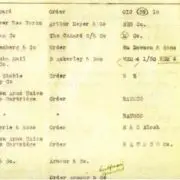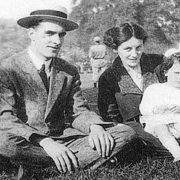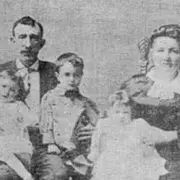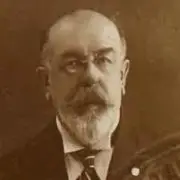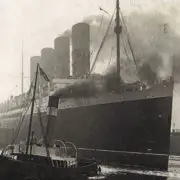The Lusitania : Part 7 : Passengers of Distinction
“How wicked of me to drown when my mother needs me in Oregon.” These words echoed through Dorothy Connor’s head as she was dragged down by the sinking Lusitania. How did the Wellesley Graduate, on her way to help with the war effort, end up in such a precarious situation?
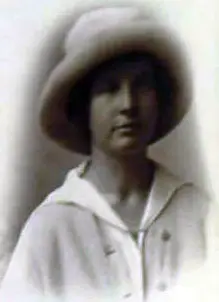
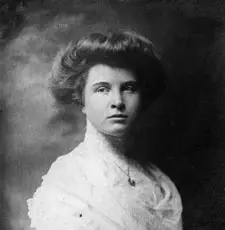
Dorothy Connor
Miss Connor lived the sort of life of which films are made. A typical well-to-do young girl of her era, her war experiences matured her into a purposeful, resourceful, and adventurous lady, and hers is among the most endearing of all Lusitaniabiographies. She was born in September 1890, to Charles and Katharine Connor of New Albany, Indiana. The Connors lived in a large Victorian home they named “Daisy Farm,” and led a prosperous existence. Dorothy attended school in Germany during an extended family trip abroad. Dorothy’s older sister, Sara Katharine, married Dr. Howard Lowrie Fisher, Dartmouth graduate, and Dorothy’s son believes that, as a five year old, she served as the flower girl.
Katharine Connor moved her family East, to Rye, New York, after her husband’s death around the turn of the century. Dorothy attended prep school, and was accepted to Wellesley, where she pursued a History degree. She was active on campus beyond her studies, participating in activities ranging from theatre to an eating club. She was a member of the Phi Sigma Sorority. She planned to become either a secretary or a teacher upon her graduation in 1912.
Katharine and Dorothy Connor moved together to Medford, Oregon, where one of Mrs. Connor’s sons was a successful orchardist. They bought a 55 acre farm in the Rogue Valley, and built a home there which they named “Sundown Hill.” They became active in Medford society: Dorothy took part in Society Vaudeville with golfer Chandler Egan as her partner. A photo of the two dancing together is on file at the Southern Oregon Historical Society. She jokingly wrote to friends at Wellesley, “I haven’t even taught Sunday School. I have no occupation, but I am very, very busy.”
But, the young woman was about to take her first steps towards independence. Dorothy had earned her degree in first aid by 1915. Her sister, Julia, was living overseas with her husband, the future Sir Harold Reckitt, and Dorothy, interested in helping with the war effort, decided to travel abroad and utilize her skills. Dr. Howard Fisher, her brother- in- law, was going overseas, and so it was arranged that the two would meet and take the next available ship- the Lusitania. They booked two inside cabins, E-50 and E-63, on April 28, 1915, for $285. Katharine helped Dorothy pack, and lent her a suitcase and a trunk. She told her mother, in jest, that she was, “afraid something might happen to them.”
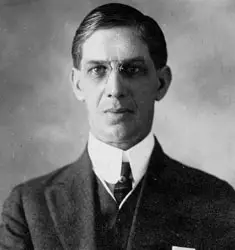
Howard Fisher
Dorothy Connor and Howard Fisher arrived at the pier early, on the morning of May 1st. Fellow passenger, Thomas Home, recalled that there was a lot of baggage and that tickets were being thoroughly examined as people boarded the ship, which he believed caused a slight delay. Dorothy sent her mother a color portrait postcard, from the ship’s writing room, labeled Lusitania and Mauretania. She wrote: Expect a cable before Saturday or Sunday as we are not due in until Saturday. I thought it was Thursday, but since they have no competition it seems they don’t have to hurry! It is now eleven-thirty and they haven’t started yet though I don’t know why. I wish they would, it’s a rather chill, damp day…Dorothy.
Miss Connor went on deck to learn the reason for the delay but, after talking with a few people, did not find a conclusive answer. She returned to the writing room and, to pass time, composed a long letter to her mother. It read, in part, “The Lusitania is now being held up and there is a report that the captain has lost his nerve, but I think we will get off all right.” The delay, in fact, was because of the transfer of passengers, baggage, and crewmembers from the Cameronia, whose voyage had been cancelled upon her requisitioning. The Lusitania departed for Liverpool at about 12:30 in the afternoon.
Dorothy and Howard settled into the daily routines of shipboard life, and began to make friends and renew acquaintances. They met Charles Plamondon, Chicago social and civic leader and a friend of Howard Fisher’s brother, Walter. They found their tablemates in the dining room, D.A. Thomas and his daughter, Lady Margaret Mackworth, agreeable; they were returning to South Wales after a business trip to the United States. The crossing proved not to be as exciting as Dorothy had hoped it would, and she wrote in a letter to her mother, “I’d never seen a more uneventful or stupid voyage.” Margaret Mackworth recalled that the submarine threat had been discussed, and Dorothy commented, “I can’t help hoping that we get some sort of thrill going up the channel.”
Dorothy spent the Lusitania’s final morning packing. When she dressed for lunch, she chose a fawn-colored tweed suit with matching boots. She accessorized with her sapphire and pearl pins, and a treasured ring; an owl carved of gold, with diamond eyes. She, D.A. Thomas, and Lady Mackworth arrived on time, but Howard Fisher was delayed. Miss Connor recalled that she ordered squab. When Fisher arrived, he explained, “All trunks were ordered on deck by 10pm, so I told Dorothy that I would pack mine in the morning and get it over with. The trunk was packed with difficulty and delayed me.” He, too, ordered squab.
Lady Mackworth and her father finished their lunches, and then goodbyes were said. D.A. Thomas recalled Dorothy’s remark, and as he and Margaret made their way to the elevator, he commented “I think we might stay up on deck tonight, to see if we get our thrill.” (Dorothy Connor’s family revealed to Mike, that she consistently and emphatically denied having made the famous “thrill” remark. – authors)
Dorothy vividly described the moment the Lusitaniawas struck: It was while Howard was finishing his lunch and I was sitting waiting for him that the explosions came- two, apparently right under us. Everyone dashed and Howard and I did, too, though I did not realize for a minute that it was a submarine. Howard Fisher recalled the explosion: Bang! Came a rather dull sound like a soft blast, a slight rock and in a few seconds a listing of the ship to the side on which we were struck. Dorothy said ‘What is that?’ I replied ‘That is what we came after- a torpedo; we must go on deck.’
There was a severe list as they climbed the stairs to the boat deck. The two thought that it might be safer on the high side, and so exited through the port door. Margaret Mackworth soon emerged from the entrance: As I came out into the sunlight, I saw standing together Dr. Howard Fisher and his sister-in-law Miss Connor. I asked them if I might stay beside them until I caught sight of my father.
“Everything was confusion,” Howard Fisher would say of the scene at one of the port boats. “Men jumped on women and children trying to get into it.” Fisher would not allow Miss Connor to join the crowd, nor did she wish to after seeing the lifeboat overturn while being lowered. She later wrote to her mother: I won’t tell you about the lowering of the boats for the carelessness, the inefficiency, and the ignorance of the deck hands that did it was too terrible. Lady Mackworth turned to her friend and commented, “I always thought a shipwreck was a well organized affair!” Dorothy replied, “So did I, but I’ve learned a devil of a lot in the last five minutes!”
Dr. Fisher went below to grab life jackets for himself and Dorothy. He got as far as D Deck and was shocked to find: My cabin deck was already flooded, so I returned to the deck above, rushing here and there in the dark, for the electric lights had already gone out, trying open cabins for a chance lifebelt left behind by its owner. Miss Connor and Lady Mackworth waited on the boat deck for him to return. A crewman came by, announcing, “The gates have been closed, the ship is not sinking. There is no danger. Help is at hand. No more boats will be lowered.” The ship began righting itself, and a sigh of relief passed through the crowd. “Well, I guess you’ve had your thrill,” said Margaret. “I never want another one!” replied Dorothy.
Howard Fisher, hurrying back on deck, was accosted by a man who attempted to steal his life jackets. He did not succeed, and the Doctor joined the two women who waited for him. The Lusitania began to heel to starboard again. Dorothy noticed the concern on Margaret Mackworth’s face: One gets very close in three minutes at such a time, and just before we jumped I grabbed her hand and squeezed it to try and encourage her.
Dr. Fisher and Miss Connor went to the rail and prepared to jump, but Margaret Mackworth, afraid to jump, hung back on the perimeter of a small crowd, which soon blocked her way. Howard Fisher slipped through the rail, while his sister-in-law climbed over it. She said: We jumped just before the high side was submerged, and we were sucked down, down, down. I thought when we first shot in, that perhaps we’d come up again, but in the melee of things whirling around, I was caught by ropes and bars and all sorts of things that held me so fast I made up my mind that I was going to drown. Howard Fisher remembered being “Twisted and turned like a bug in a whirlpool.” Margaret Mackworth had time to undo her skirt, a dangerous impediment, before the water surged through the rails and over the side of the ship and engulfed her.
Dorothy Connor rose to the surface, unconscious, and drifted in her life jacket. Passenger Clinton Bernard, and an English nurse, spotted her from a drifting lifeboat and, suspecting that she was still alive, had her hauled on board. “Imagine my surprise to come to hours later and in my very dim consciousness discover that I was lying at the bottom of an upturned lifeboat.” She and the others atop the boat were rescued by a minesweeper, and were taken to Queenstown, where they arrived around 10pm. She used her remaining strength to walk to the Queen’s Hotel, where she calmly asked for “A single room and bath” and was surprised when “They laughed at me.” She recalled, for Adolph Hoehling, that she also received a lecture on being selfish. Her eventual roommate was a woman from third class.
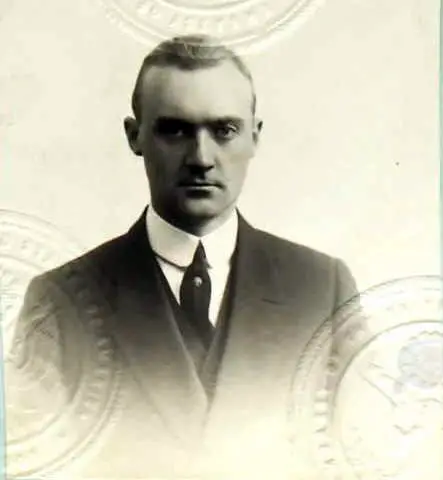
Clinton Bernard
Howard Fisher found Dorothy the following morning, and was so overjoyed that he fell on her neck with relief. Her injuries, although painful, were relatively minor: I’ve bandaged up my leg, which was rather badly gashed and has now gone to sleep. I seem to have bruised and wrenched every part of my body. Later, in London, a doctor would have to remove four large cinders ~ from the funnels~ from her ear. Dorothy’s clothing was returned to her cleaned and pressed, and when she visited with Lady Mackworth the woman commented that her outfit “looked as smart and well tailored as if it had just come out of the shop.” The foursome had dinner together, as they had every night aboard the Lusitania, and exchanged stories of their experiences during the disaster.
The following day, Dr. Fisher and Dorothy Connor departed for England. Miss Connor met Clinton Bernard aboard the train, and made plans to see him again. They were met, in London, by Dorothy’s sister, Julia Reckitt, who saw to their every comfort: She looks after me like a baby. Reflecting on items she lost, she most missed her owl ring: My dear little ring is gone- it must have slipped off when my hands got smaller in the water. But, she realized that they were just things, and that she and Howard Fisher were; the most fortunate people on the boat- we didn’t lose anything but things, and they don’t matter.
Miss Connor and Dr. Fisher kept in touch with a number of other survivors while in London. Clinton Bernard visited several times; they visited with Mrs. Lasseter after a chance meeting in Bradley’s store, with Dorothy later commenting that the disaster had aged the woman by ten years. Dorothy Connor and survivor Theodate Pope were part of a theater party that attended a performance of Rosy Rapture. And, she accepted an invitation to visit with Lady Mackworth and her father in Llanwern.
Dorothy returned to the United States in October 1915, aboard the Rochambeau. While she was home, she itemized a list of personal effects lost aboard the ship, among them:
1 Cross stole, fox $40
1 Lace evening gown $45
1 Silk gown $25
1 Velvet evening coat $50
1 Sapphire and pearl pin $25
1 Carved gold ring,
2 diamonds $50
for a total of $2,160.00.
She would file a claim against Germany for lost effects and pain and suffering, requesting $25,000 for the latter. One Lusitania-related health problem she testified to was a dilated heart. Her claim was settled, in 1924, for $15, 801.71.
Dorothy, the young woman who jokingly wrote of having “no occupation” in early 1915, and who survived a nightmarish experience shortly after, neither slipped into depression nor aimless frivolity in the months following her return to the U.S. 1916 saw her back in Europe, near the battle front, helping her sister, Julia, run the canteen she had established at Braine, not far from the Ainse River. She embraced the hard work and remarked, “The work is most interesting and I already feel very much at home.” Her duties ranged from rolling cigarettes to serving coffee: Doing the cooking and looking the part of an immaculate and dignified directrice is often difficult. She was amused by the conduct of the soldiers, who could be rowdy and who would sometimes not omit indelicate lines from the songs they would sing. She said that it was just as well that she, “did not know all the fine points of the French language. Same old story of keeping one’s eyes on the skyline.”
She wrote that when she looked out of her window, she saw: Paris buses painted gray, camions, camionettes, kitchens on wheels; gun officers on horseback and in carts and automobiles, horses going to water in the sewer which skirts our garden….I see two huge guns, one named “Marie” and the other something else, followed by ammunition wagons. Exploring the countryside, she found herself behind three guards escorting German prisoners: “Are you a prisoner, too, madamoiselle?” the French soldiers asked jokingly. She visited Brenelle, “a sweet little town half shot to pieces in the attack last month.”
Dorothy described moments of great excitement, in her letters home. The police came to search the canteen looking for a deserter. A German plane crashed in the woods after falling from a height of 3000 feet: “The German machine fell about ten-thirty in the morning. About one- thirty we found it in the woods- or what was left of it…one man escaped with a broken arm, while the other was killed.” The soldiers encouraged Dorothy to “come right up” and view the body, but she declined.
Shrapnel once struck the doorstep of the canteen and four men were killed right across the street. The pressure at the canteen proved to be too much for many staff members, and the turnover was high. Dorothy dutifully wrote home to her mother, and joked that she, “would be glad to hear what you do when Dorothy is away and you do as you please.”
Dorothy Connor was awarded a medal, her family believes a Croix de Guerre, for her bravery, at the war’s end. Miss Connor married Lieutenant Greene Williams Dugger, Yale graduate, in 1923. They met when Dorothy and her mother were guests aboard a battleship, while traveling in Panama. The Duggers had two children; a son, John, and a daughter, Mary Anne. Being a Navy family, they moved frequently, and Dorothy wrote to her Wellesley friends, “Travel is such an every day occurrence to me.” John would graduate from the Naval Academy, and Mary Anne from Wellesley.
Greene Dugger died in August 1941. Howard Fisher, Dorothy’s beloved brother-in-law, died in July 1946. Dorothy enrolled in George Washington University, taking courses in education. She was a member of the Colonial Dames of America, the Washington Wellesley Club, and the League of Women Voters. She once said, “I still find the world full of interest and excitement.” When she passed away, on August 9, 1967, her friend, Nell Cohen, would say in tribute, “It is good to know that right up to the end of her life she maintained her beauty, her charm and her dignity.”
James Reckitt, Dorothy Connor’s brother in law, published a book about his wartime experiences: V.R. 76; A French Military Hospital in 1921. Dr. Howard Fisher contributed this account:
A RECOLLECTION
The outbreak of the Great War found me in distant Oregon. Though I knew but little of the warring nations, I was, like most Americans, intensely affected and mentally placed my sympathies where they have ever since been. I was pro- British from the time the first cablegram found a place in the daily papers.
I was pro-British for several reasons. First, I had lived among English people in British India for six years and had learned to appreciate their real worth; I had an English brother-in-law; I had lived nine months as a student in Berlin and despised the Prussians and, finally, the rape of Belgium was a crime against humanity that could not be forgiven. Then, as the months went by, though the war touched neither me nor mine, the brutality of the Germans, the call for medical men and more medical men, quickened a slumbering impulse to thrust myself into the conflict.
When, in 1915, Mr. and Mrs. Reckitt commissioned Dr. Lewis Conner to select a medical staff and equipment for a field hospital to operate in Belgium, I wrote Dr. Conner. When my letter reached him, the staff was full and for the first time I realized how great was my desire to serve, how keen my disappointment.
Again the days went by as usual. I had settled down to a normal life. Then came a cablegram to me from Mr. Reckitt, “Come at once.” I was to take a part in Germany’s defeat.
There were many notable passengers on that last voyage of the Lusitania, among them Lord Rhondda (at that time Mr. Thomas) and his daughter, Lady Mackworth. Madame du Page, the wife of Belgium’s Surgeon-General, was also on board. So long as I live I shall never forget this lady’s sad, anxious face. She had just finished a tour of the United States and was returning to her ravaged country with a money contribution for the Belgian hospitals. Had she some prophetic vision of the coming disaster? Her son she had given to the war. Her husband was daily in the fighting-line. She was lost with the sinking of the ship, but her frail body reached friendly hands, I am told, and she found a last resting-place in the soil of her beloved country, out on a lonely and desolate stretch of sand dunes that Belgium still held as her own.
Lady Mackworth I saw in the wild confusion that followed the wounding of the ship and its great list to starboard. She was alone, anxiously searching for her father in the crowd that rushed here and there. She, with another woman and myself, stood on the larboard side and, after watching the ill-fated attempts to lower the lifeboats, decided to jump
into the sea rather than await the terrific rush and impact of water that would follow as the ship plunged headlong to the depths.
Lord Rhondda was returning from a munitions mission to Canada and the United States. He was very grave, ate sparingly and neither at table nor elsewhere was inclined to casual conversation. That he was masterful and shrewd in his own affairs and in those of his country, there could be no doubt, but he met his match in a raw Irish- American in the Queenstown Hotel on the night of the disaster.
It was the one humorous incident of that tragic day.
It was past midnight. The hostelry was full of the Lusitania’s ill and wounded, who were just finding the quiet and rest so much needed. There were but three of us in the parlour, Lord Rhondda, the Chief Surgeon and myself. I had said good-night and was lying under a table rolled up in a blanket, the other two were engaged in quiet talk, when in burst this wild Irish-American. In some miraculous way he, his wife and little child had been saved from death, though they had all been swept into the sea. He was celebrating his own, and their, escape. His pockets were full of whisky, his stomach equally full. He was celebrating and, willy-nilly, the two men must celebrate with him.
He burst into song and my companions added angry remonstrance to their refusal to drink.
“Drink with me and I’ll shut up.”
A second curt refusal followed.
“Then I’ll raise hell!” said the tipsy, hysterical man, “for I still have my wife and baby.”
Then he spied me under the table and dragged me out as he would a sack. “You too,” he said, “drink! ”
“No!” I replied.
As he was about to let out a war-whoop, Lord Rhondda reached for the bottle, took his drink and the surgeon and I followed in his wake.
There was one other bit of humour incident to the sinking of the Lusitania that still makes me grin when memory brings back those tragic days. That was the crestfallen looks of the porters as they ran along the London railway platform, ready to pounce upon the luggage of the travelers.
But it was the Lusitania special and of luggage there was not a trace.
The reception of my sister-in-law and myself at our hotel was no less comic. The night watchman at the door all but refused us entrance, for we were a bedraggled pair of vagabonds, disheveled from a sleepless night and without kit; I with a black eye and garments much the worse for bad usage. The watchman stood perplexed. I looked at my sister-in-law, with her little paper bundle under her arm, and grinned at what I saw. She looked at me and my queer make-up and smiled at the picture she beheld. Then we mentioned the Lusitania and the doors flew wide and hot baths, food and soft beds made us forget we were among strangers.

